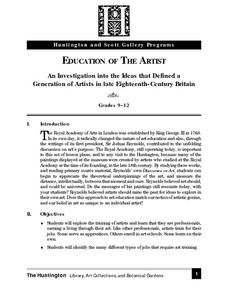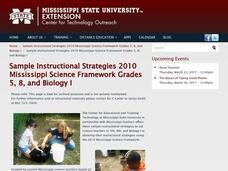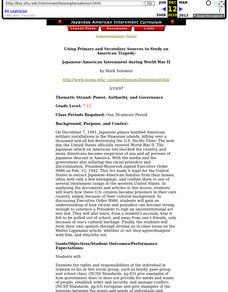Stanford University
Japanese American Incarceration
Using documents, such as reports from government sources and civil rights activists, budding historians explore the justification for forcing hundreds of thousands of Japanese-Americans to leave their lives and re-evaluate that tragic...
Curated OER
Trial of King Charles
In this King Charles worksheet, students read about the facts of the trial of King Charles. Students also learn the characters who took part in the trial.
Curated OER
Pros and Cons: A Childcare Debate
Students research prevailing attitudes and Rousseau's position on child rearing in the 18th century. They consider attitudes toward motherhood and childcare in our own culture through interviews with peers and family members.
Curated OER
Brown v. Board of Education of Topeka
Twelfth graders explore desegregation as it occurred at various stages in United States history. They specifically chronicle the role of South Carolina in the desegregation case of Brown v. Board of Education.
Curated OER
Exploring Women's History Month
Explore and celebrate the contributions of women past and present.
Curated OER
Back to School Rules
Learners discuss basic classroom rules as a whole class. They break into groups to determine other rules which they present to the whole class. They vote on two or three of the best rules to use for the rest of the school year.
Curated OER
Corps of Discovery
Students assess their knowledge of the Corps of Discovery through a written pretest, follow the journey of Lewis and Clark on the internet, record data on events, dates, places, people, animals, distance traveled, and geographic...
Curated OER
Local Mobilization for War
Tenth graders analyze how government policies led to complete concentration in war effort, evaluate how patriotism was encouraged by many local and state groups, and discuss fate of Japanese Americans.
Curated OER
Campaign 2004: Classroom Electorate
Young scholars role play as political analysts first forecasting the electoral college vote in a presidential election and then, following the results of the actual count. They study the role of swing states, and why political...
Curated OER
Education of the Artist: An Investigation into the Ideas that Defined aGeneration of Artists in late Eighteenth-Century Britain
High schoolers explore training of artists as professionals, and identify the many different types of jobs that require art training.
Curated OER
The Battle of Horseshoe Bend: Collision of Cultures (54)
Students discover the political and cultural conflicts that led to the Battle of Horseshoe Blend, Alabama, and evaluate historical maps of the Battle of Horseshoe Bend. They research American Indian cultures that were located in their...
Curated OER
Developing a Media Portfolio
students discuss the vehicles used by media to feed images to consumers. In small groups, 9th graders are given magazines and asked to pick out the ads that appeal to them. They write responses to the questions:
Curated OER
Yam and Eggs
Learners gain knowledge about the different kinds of foods people eat around the world for breakfast. They look at a map and see if they can come up with reasonable answers as to why location may affect what people eat. Students also...
Curated OER
Great Oaks From Little Acorns Grow
Pupils assemble an acorn craft to use as a puppet. They discover that acorns are the fruit and the seed from which oak trees grow. They give an example, of a historical figure or talk about a member of the community or family that...
Curated OER
Volunteering For Others
Students research the kind of volunteer options for teens in their area. They estimate the number of teens who do volunteer by conducting a simple survey. Students display findings in a paper and in charts.
Curated OER
From the White House of Yesterday to the White House of Today
Students investigate the history of and the current state of the White House. They take a virtual tour of the White House and Monticello, explore various websites, and compare/contrast Monticello with the White House.
Curated OER
Social Studies: Don't Ask, Don't Tell
Students review the U.S. military's policy concerning gay and lesbian soldiers. They research the "don't ask, don't tell, don't pursue" approach and determine its meaning. Students interview military personnel and present their findings...
Curated OER
Protesting within First Amendment Rights
Students research the First Amendment and what it says about the right to peaceably assemble as well as read in particular about those who were arrested or removed from an area for being disruptive during a protest on the War in Iraq....
Curated OER
Graphing the Past Using Today's Technology
Eighth graders research statistical data regarding their current social studies unit. They write questions about the measures of central tendency, collect and analyze the data, insert the data into a spreadsheet, and generate graphs.
Curated OER
The Cost of War
Students view a video clip about the cost of war. They discover what goes into paying for a war. They examine the need for a budget in the government. They read a news story about this topic as well.
Curated OER
Breaking News English: Rappers
For this rappers worksheet, students read the article, answer true and false questions, complete synonym matching, complete phrase matching, complete a gap fill, answer short answer questions, answer discussion questions, write, and more...
National First Ladies' Library
A Crippling Cough: Tuberculosis on a Rampage
Students use problem solving skills to examine symptoms, causes, and treatment of tuberculosis in modern times and in early 1900s. Students read patient case, work in teams to diagnose illness, and conduct Internet research to confirm...
Curated OER
Breaking News English: Europe
In this Europe worksheet, students read the article, answer true and false questions, complete synonym matching, complete phrase matching, complete a gap fill, answer short answer questions, answer discussion questions, write, and more...
Curated OER
Japanese-American Internment during World War II
Learners write an in-class essay on whether they agree/disagree with Lippmann's article concerning Japanese-American internment

























